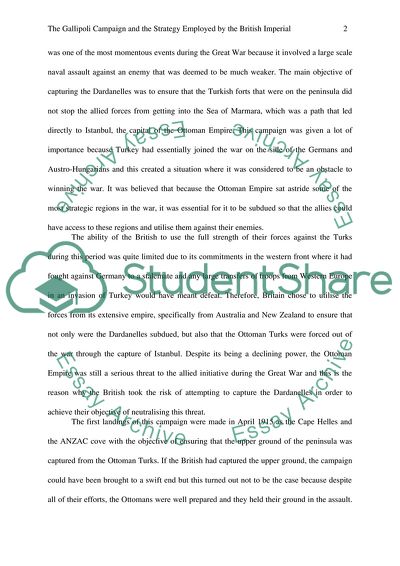Cite this document
(The Gallipoli Campaign and the Strategy Employed by British Imperial Essay Example | Topics and Well Written Essays - 3000 words, n.d.)
The Gallipoli Campaign and the Strategy Employed by British Imperial Essay Example | Topics and Well Written Essays - 3000 words. https://studentshare.org/history/1855131-analyse-the-gallipoli-campaign-and-the-strategy-employed-by-the-british-imperial-from-this-perspective-assess-why-was-it-successfulunsuccessful-tim-travers-gallipoli-1915-2009
The Gallipoli Campaign and the Strategy Employed by British Imperial Essay Example | Topics and Well Written Essays - 3000 words. https://studentshare.org/history/1855131-analyse-the-gallipoli-campaign-and-the-strategy-employed-by-the-british-imperial-from-this-perspective-assess-why-was-it-successfulunsuccessful-tim-travers-gallipoli-1915-2009
(The Gallipoli Campaign and the Strategy Employed by British Imperial Essay Example | Topics and Well Written Essays - 3000 Words)
The Gallipoli Campaign and the Strategy Employed by British Imperial Essay Example | Topics and Well Written Essays - 3000 Words. https://studentshare.org/history/1855131-analyse-the-gallipoli-campaign-and-the-strategy-employed-by-the-british-imperial-from-this-perspective-assess-why-was-it-successfulunsuccessful-tim-travers-gallipoli-1915-2009.
The Gallipoli Campaign and the Strategy Employed by British Imperial Essay Example | Topics and Well Written Essays - 3000 Words. https://studentshare.org/history/1855131-analyse-the-gallipoli-campaign-and-the-strategy-employed-by-the-british-imperial-from-this-perspective-assess-why-was-it-successfulunsuccessful-tim-travers-gallipoli-1915-2009.
“The Gallipoli Campaign and the Strategy Employed by British Imperial Essay Example | Topics and Well Written Essays - 3000 Words”. https://studentshare.org/history/1855131-analyse-the-gallipoli-campaign-and-the-strategy-employed-by-the-british-imperial-from-this-perspective-assess-why-was-it-successfulunsuccessful-tim-travers-gallipoli-1915-2009.


